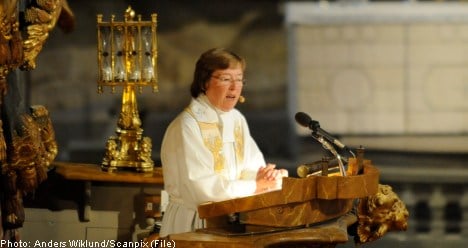The Local: Why should someone vote for your party?
Therese Wallqvister: The Liberal Party wants every individual to be able to make their own choices. We want to make life easier for those who work, study and start their own businesses, so that their efforts are worthwhile. There should be a safety net for those who really need it.
TL: What is this election about? What is the key question facing Swedish voters?
TW: More knowledge in school. The Liberal Party and its coalition partners in the government have done a great deal to improve the school results, but more reforms are necessary to ensure that every pupil gets the support he or she needs.
More freedom of choice for the elderly. People who live in retirement homes do not always get to go out every day or choose what they want to eat.
More people need to find work.
TL: What is your party going to do about this issue?
TW: With the new school legislation, teachers will have the authority to maintain order in the classroom. Grades will be given earlier, from the sixth grade.
Teacher training will be more specialised based on the subjects the future teacher will teach. Special teachers will be educated so that pupils in need get extra support. In upper secondary school, apprentice programs will be created.
The elderly will have the right to go outside everyday if they wish. Retirement homes must provide a choice of different meals. Husbands and wives of residents will have right to live with their spouses even if they are not in need of care themselves.
We want employers to have lower costs for employing young people and people who have been out of work for a long time. Apprentice programs should be created also for young people who are not pupils in upper secondary school.
Language training for immigrants must be improved and they should be able to work while still learning Swedish.
TL: What does your party see as the key to helping non-Swedes successfully establish themselves in Sweden?
Cindy Sturesson: Segregation and discrimination against immigrants is a tragedy for the individuals concerned, but is also a serious waste of resources for society at large. Many immigrants in Sweden are left outside the labour market and have become subject to passivity and dependence on welfare benefits.
Sweden needs a liberal integration policy that liberates every individual’s power of initiative. The key to better integration is more jobs and better school results. Schools must be reformed to focus on knowledge, and on the Swedish language in particular. A person applying for Swedish citizenship should have a certain knowledge of Swedish.
Since 2006, a job and development guarantee has been introduced, offering all immigrants the possibility and the obligation to work. We must put an end to isolation and welfare dependence.
We also need to strengthen the fight against discrimination and increase the presence of police in segregated areas.
TL: What do you say to foreign students who come here to study, but find it hard to find a job?
CS: Sweden needs more entrepreneurs, more work and more taxpayers in order to pay for education, health care and an aging population. One solution is reduced tax pressure and a significant cut in red tape for businesses. Taxes on business owners and risk capital as well as social charges for employers need to be reduced. Labour market laws must be modernised. Household services should be made tax-deductible in order to create more jobs in the service sector.
TL: What is your party’s top foreign policy issue?
CS: Our overarching aim is a foreign policy that promotes democracy. Sustainable peace can only be sustained between democracies and it’s only democratic market economies that can guarantee human rights. To contribute to the spread of democracy is the main goal of the Liberals’ foreign policy.
To return to the election guide main page, click here.


 Please whitelist us to continue reading.
Please whitelist us to continue reading.
Member comments